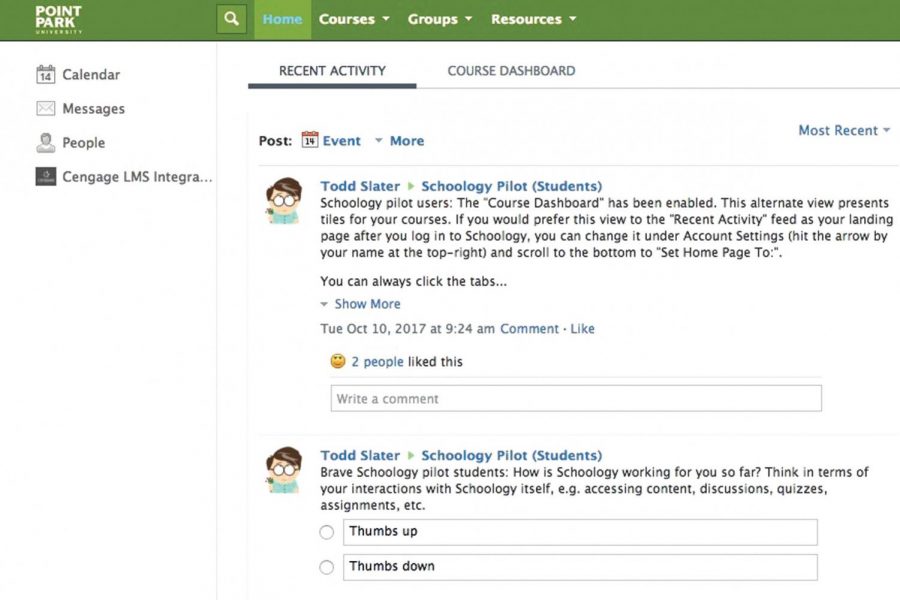University gradually transitions to Schoology
Photo by Screenshot | schoology.com
University students have slowly been transitioning to Schoology, a website that the university hopes will replace Blackboard soon.
January 16, 2018
Blackboard has long been at the center of Point Park. Students rely on the system to view grades, assignments and notes, and it is the only legitimate campus for full-time online students.
As of late, the university has been looking to replace Blackboard, which has been in use since 2012. After numerous surveys, evaluations and assessments, Schoology has won out as the university’s new learning management system, and Point Park’s Online Division has been working on the transition.
Last semester Schoology was tested by seven courses. According to Nelson Chipman, the executive director of Point Park Online, the feedback received from the test courses was positive overall.
“Anecdotally the feedback is all good and very positive. I mean, I think with any system as you kind of learn how to play within that system, I think that what features are a little bit different or enhanced, there’s always that learning curve,” Chipman said. So we had mostly a lot of questions within the first two weeks of the semester, and then everybody had figured it out and I think that it was a very successful sort of initial pilot this fall.”
Cara Frieze, an assistant professor in the cinema arts department, was a part of the Schoology test group last semester. In a phone interview on Monday, Frieze said the transition was not very difficult because of all of the support the new Schoology classes received.
“I think the first week of setting it up and getting things going I was a little lost just because I wasn’t used to it, and so it just took a little time to find out where certain things that we do in Blackboard is now located in Schoology,” Frieze said.. But the school has set up a really nice group on Schoology with all of the faculty that sort of kick-started it, so we were able to post questions up there asking for help if we needed it.”
Frieze said that by the time she went to the group to post a question, another faculty member usually already asked it and had the question answered.
This semester Schoology is now being used by even more courses. According to Chipman, there are approximately 134 classes that have made the switch this semester.
“I think we have 134 classes on it this semester, and that may be a little bit higher because a few people have come in at the end and said ‘Hey, can we add in? Can you create this section for us in Schoology?’ And I believe the instructor count is about 99 instructors,” Chipman said.
Although there are significantly more classes using Schoology this semester, it is still a small group in proportion to how many classes are still on Blackboard.
“We’re a long way from halfway,” Chipman said. “So, 134 classes is close to maybe 14 percent. During the semester we run a little shy of offering a thousand classes.”
According to Chipman, graduate level online programs were the first to transition, so online students would only need to go on to one program for their classes. They then asked for volunteers who were doing on-campus or “on-ground” courses, because it was believed the transition would be easier.
“We thought, if I’m running my class out of Schoology, then you see me every week, and as an instructor I can be like ‘don’t forget to go to Schoology,’ and so we thought that would be easier for students to sort of bounce between two systems because they were on-ground and having more contact with their instructor. And so we got about 35 volunteers for that,” Chipman said.
According to Chipman, the transition this semester has been going fairly smoothly.
“The start of this semester has been quieter than last. We had a dozen training sessions for faculty in the fall, face-to-face and online, so I think that helps faculty get comfortable with the change, because any kind of change like this, especially mid-year, can seem a little daunting,” Chipman said.
Colleen Hooper, assistant professor of dance, made the switch to Schoology for the spring semester for the extra support. Hooper has never used Schoology before, and attended a session before school started. Hooper said the transition has been fairly easy.
“They copied everything over from Blackboard and in a lot of ways I can use it similarly to how I use Blackboard,” Hooper said in a phone interview on Monday.
Hooper said that one of the biggest adjustments was switching from the email notifications that students usually receive from Blackboard to the updates page on Schoology. Hooper’s favorite feature of Schoology is the attendance.
“There’s an attendance feature that’s super helpful because that way students can see how many times they’ve missed class or been late to class and you can keep track of it there, because that was something that was difficult with Blackboard, there wasn’t a way to do that,” Hooper said.
Hooper’s students have not had much time to try Schoology, although Frieze’s students this semester seem to have no problems navigating the program.
“I’ve been asking and all of them say it’s really intuitive; they easily figured it out,” Frieze said. “There was really no training necessary for them. So, when they’re on it they seem to like it, but I think right now with the transition it’s just a little annoying, I guess, for them to have to log into two places at once.”
Jenelle Slodki, a senior business management major, has two online courses on Schoology.
“I like it to a degree,” Slodki said over the phone on Friday. “I guess the biggest thing that I like is on the side you can see exactly what is due what day and everything, and it kind of gives you an up to date calendar. But I think it’s too much clicking just to get into a module or an assignment, that would be my biggest complaint. And there’s no word count on the discussion board.”
Slodki stated she still likes Blackboard best, although she believes that over time she will warm up to Schoology.
According to Chipman, the university has not made the full switch to Schoology this semester because of the short period of time between when final grades are due and the start of the term.
“I think that more of a graduated approach is, while people may be excited and anxious and may want to get into the new system, I think that this is going to work out long term,” Chipman said. “Like it will be instead of ripping a band-aid off really quickly you take it off slowly so it’s not quite as painful.”
Chipman stated that all courses this summer will be on Schoology, and that the complete switch will take over in the fall of 2018. Chipman is optimistic about the switch being completed in that time, although he stated that it may be difficult to train some of the professors who are less confident with using Schoology, who may have waited until the last minute to make the switch.
Chipman believes that the Schoology test courses of last semester will be helpful to the overall transition.
“I think what’s worked in our favor, if you can think about how movies get released, there’s that limited release and then word of mouth builds and then everybody’s kind of excited,” Chipman said. “So I think that the instructors last semester created a lot of positive word of mouth, and I think maybe students did as well, saying ‘Yeah it’s a lot easier, it’s a lot easier to upload, it’s easier to find stuff, it’s more user-friendly in a social media kind of way.’ So I think that has created some excitement for it.”




















